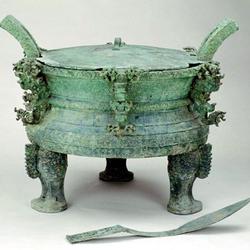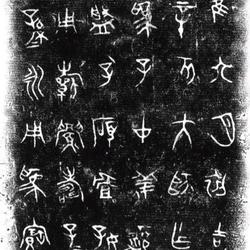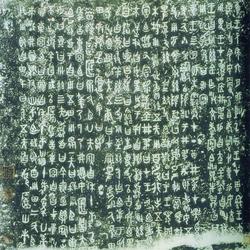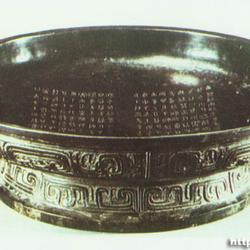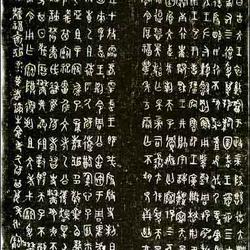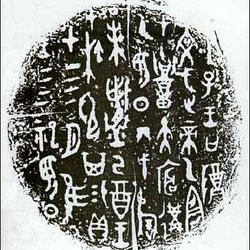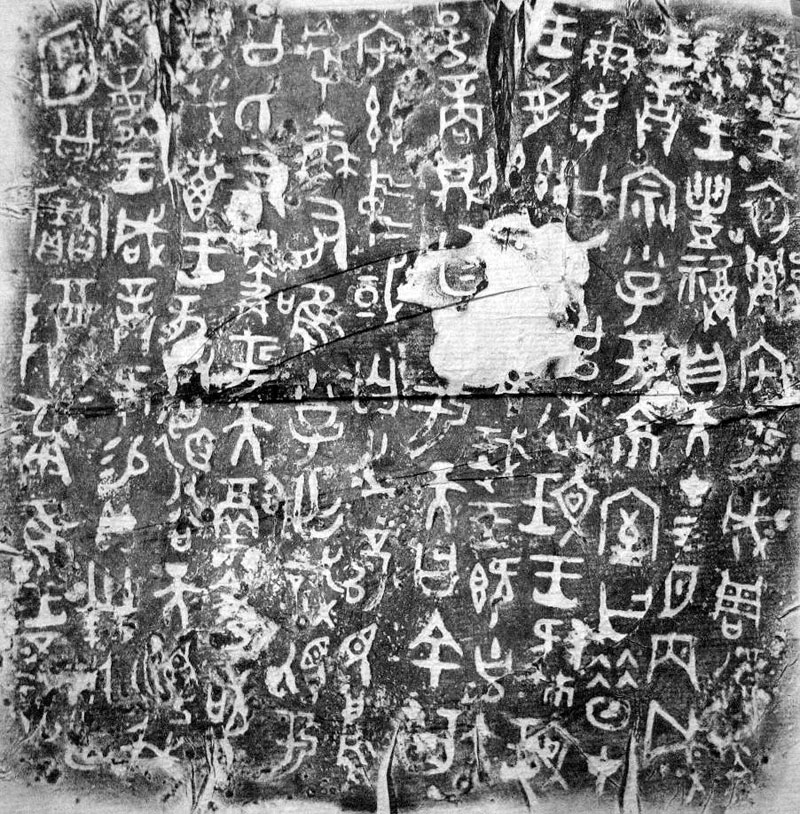
Rubbings of He Zun's inscriptions
This is a bronze ware made by a member of the clan named He during the reign of King Cheng of the Western Zhou Dynasty. It is a precious work of art from the early Western Zhou Dynasty and the first bronze ware with a date in the early Western Zhou Dynasty. It was unearthed in 1965 in Jia Village, Baoji County, Shaanxi Province. Height 38.8 cm, diameter 28.8 cm, weight 14.6 kg. It has a round mouth, a prism, a long neck, a slightly bulging abdomen, and high round feet. There are exquisite high-relief animal face patterns on the abdomen and feet, and the horn ends protrude from the surface of the vessel. There are four edges on the side of the body. The shape is strong and the craftsmanship is exquisite. The shape and decoration of this vessel are unique, solemn and thick, beautiful and elegant, with a strong sense of subjectivity. It has a round mouth and a square body, decorated with four large edges. There are 122 inscriptions on the inner bottom of the vessel, 3 are damaged, and 119 are extant. It records the events when King Cheng inherited the legacy of King Wu and built the Eastern Capital of Zhou Dynasty. It is consistent with ancient documents such as "Shang Shu·Zhao Gao" and "Yi Zhou Shu·Du Yi" and has important historical value. Hidden in Baoji Bronze Museum.
The inscription says: "Only Wang Chuyu lived in Chengzhou. He reported (meeted) the king's blessings and came to heaven. In the fourth month of Bingxu, Wang Gaozong's son came to the capital and said: 'I used to live in Erkao Gongshi. King Wu Wen was defeated, and King Si Wen was ordered to do so. But King Wu defeated the merchants in Dayi, and the court reported to heaven, saying: The rest of the people live in China, and they are here to serve the people. Woohoo! Although you are a young man who is ignorant, he is regarded as Gong's family. , I have been honored by Heaven, and fulfilled my destiny. Enjoy it! 'Only the king is respectful and virtuous, and teaches me to be insensitive. Wang Xiangao. Why give Bei Sanpeng to be used as a treasure of Yu Gong to respect the Yi. Only the king has five sacrifices."
The main meaning of the inscription is: In April of the fifth year of King Cheng, King Zhou began to build the capital in Chengzhou and performed a blessing sacrifice to King Wu. On Bingxu day, the king of Zhou gave an instruction to the clan boy He in the imperial palace. The content mentioned that He's late father Gongshi followed King Wen, and King Wen was ordered by God to rule the world. After King Wu destroyed the Shang Dynasty, he sacrificed it to heaven and used this place as the center of the world to rule the people. The king of Zhou rewarded He Bei with 30 friends, so He was honored as a memorial. This is an important admonishment and encouragement message from King Zhou Cheng. It provides valuable information for studying the history of the early Western Zhou Dynasty.
The highest value of He Zun is that there is a 122-word inscription cast inside the statue! The inscription records that King Cheng of Zhou inherited the legacy of King Wu and built Luoyi, known as "Chengzhou", which is today's Luoyang. This important historical fact has attracted great attention in the academic world. At the same time, the word "China" appeared for the first time in He Zun's inscription as a phrase. This is a major event that we as Chinese people should remember. Bronze inscriptions are precious history cast in bronze. In addition to confirming historical records or making up for the shortcomings of historical records, they also represent truth, integrity, eternity, and immortality.

